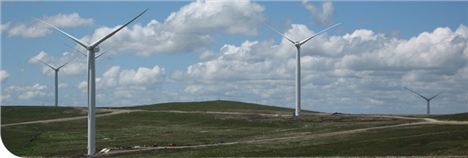THIS may seem startling, but wind farms are one of the most effective mechanisms for the unwanted redistribution of wealth.
To keep pace with India and China’s extra coal burn 1000 wind turbines a week or 52,000 a year would have to be brought online.
Whatever good intentions led to their creation across the UK, the effect is to make the rich wealthier and to further impoverish the poor.
This goes all the way to the top.
The Prime Minister’s father-in-law is Sir Reginald Sheffield. He is making £350,000 a year from the publically subsidised wind farm on his estate. It is expected that these eight ugly, 400ft high turbines, will add £8m to Sir Reginald’s considerable wealth, estimated to be £20m.
Sir Reginald is not on his own.
It is estimated that a small number of private land owners, many of them already in receipt of European Union farm subsidies, will share approximately £1bn in rent over the next eight years.
This huge sum of money will not be paid for by the energy producing and distributing companies (although they will also have their snouts in the subsidy trough), instead the poor consumer will foot the bill. It is estimated that £500 per year on average could be added to every household’s energy bill by 2020.
 Connie HedegaardThe lavishly funded wind industry, backed by the hapless Energy Secretary Ed Davey and Connie Hedegaard, European Commissioner for Climate Action, justifies this policy on the grounds that it creates jobs, reduces carbon dioxide emissions and provides ‘energy security’.
Connie HedegaardThe lavishly funded wind industry, backed by the hapless Energy Secretary Ed Davey and Connie Hedegaard, European Commissioner for Climate Action, justifies this policy on the grounds that it creates jobs, reduces carbon dioxide emissions and provides ‘energy security’.
Not one of these alleged benefits survives serious scrutiny.
The main justification, of course, is the drive to reduce carbon dioxide in the atmosphere. Connie Hedegaard boasts that carbon emissions in Europe between 1990 and 2009 have fallen by 16%, at a time of significant economic growth. What she fails to mention is that over the same period carbon consumption has increased by 19%.
The policy of restricting carbon emissions in Europe is in effect a de-industrialisation policy as production becomes more expensive in Europe and industry moves to China and India or anywhere else with less expensive and more polluting energy. European politicians rather than boasting should be hanging their heads in shame at the perverse consequences of their targets.
This is one of the reasons that carbon dioxide in the atmosphere is now increasing annually at three parts per million not two parts per million.
I am grateful to Professor McKay of Cambridge and Professor Helm of Oxford for calculating that to keep pace with India and China’s extra coal burn 1000 wind turbines a week or 52,000 a year would have to be brought online. Wind is never going to deal with the problem of increasing carbon dioxide.
The drive for wind is both perverse and futile.
In one sense now that we know that the targets for reducing emissions of carbon dioxide are leading to increases and the loss of industrial jobs we don’t have to deal with the other justifications for moving to wind energy, it is however instructive to consider these claims.
It is regularly suggested that tens of thousands of jobs are being created by wind farms and other renewables.
 Nice work if you can get it. Peel Group's Scout Moor wind farm on the moors above Rochdale
Nice work if you can get it. Peel Group's Scout Moor wind farm on the moors above Rochdale
This is only accurate if you count only the jobs created and not the jobs lost either by de-industrialisation, because of the higher costs of energy or the opportunity lost to invest in less expensive jobs. A study provided for the Scottish Parliament showed that for every job created two and a half jobs were lost elsewhere in the UK economy.
The most absurd reason for moving to wind power is that it gives us energy security. True but only if the wind blows.
The coldest weather is nearly always associated with still air and this illustrates that you always have to have a back-up supply. The cost of this reserve supply is higher because it is only used sporadically.
Just before Christmas the Government introduced its long awaited Energy Bill, in which this madness will be incorporated into law. Ed Davey’s justification for carrying on with this failed policy is that the price of gas and oil are going to carry on increasing. They may not, and if as is possible they reduce, the cost to industry and the domestic user will be even higher.
There has been a dramatic drop in the price of gas in the United States following the exploitation of shale gas. This could easily lead to a slump in the world price of gas and oil particularly if Europe uses its own shale gas resources.
What might be a sensible hedge against volatility in the energy market has become a one way bet of about a hundred and ten billion pounds that oil and gas prices will increase.
The results are clear.
Land owners will make money. Energy companies will have guaranteed profits. The consumer will suffer. The countryside will be industrialised. The world will not be saved.
 Graham StringerGraham Stringer is a regular columnist for Manchester Confidential. He is the Labour Member of Parliament for Blackley and Broughton with a majority of 12,303. He was elected to Parliament in 1997 for the now abolished constituency of Manchester Blackley. Prior to this he was the Leader of Manchester City Council from 1984-1996. He is one of the few MPs to have science experience, as a professional analytical chemist. He is a member of The Science and Technology Committee at Westminster.
Graham StringerGraham Stringer is a regular columnist for Manchester Confidential. He is the Labour Member of Parliament for Blackley and Broughton with a majority of 12,303. He was elected to Parliament in 1997 for the now abolished constituency of Manchester Blackley. Prior to this he was the Leader of Manchester City Council from 1984-1996. He is one of the few MPs to have science experience, as a professional analytical chemist. He is a member of The Science and Technology Committee at Westminster.











